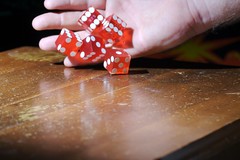 If I pick up a die and roll it, the result is random. What does that mean? Essentially, it means unpredictable. But what if I allowed you to measure every single physical constant involved in the die throw beforehand? Every attribute of the die, air, and table, down to the positions and movements of atoms, and their energy levels and perturbations. Every detail of the velocity and trajectory of my throw. Every iota of the energy levels in the air, from heat, light, etc. All to an arbitrarily high degree of precision. Couldn't you then predict the die roll?
If I pick up a die and roll it, the result is random. What does that mean? Essentially, it means unpredictable. But what if I allowed you to measure every single physical constant involved in the die throw beforehand? Every attribute of the die, air, and table, down to the positions and movements of atoms, and their energy levels and perturbations. Every detail of the velocity and trajectory of my throw. Every iota of the energy levels in the air, from heat, light, etc. All to an arbitrarily high degree of precision. Couldn't you then predict the die roll?Most educated people today essentially take for granted that the answer is "yes", but it wasn't always so. That realization, the core concept of determinism, is the defining, core concept behind the birth of science. And it changed the world more than almost any other idea. That things that happened, happened because of physical things that could be known, understood, even manipulated, rather than at the whim of unknowable spirits, gods, and ghosts. That the only limit on how much you could know and affect the world around you was in you (how much time, intelligence, and resources you could bring to bear in a lifetime), not in the universe itself. Before this, science was a tentative poking to see if we could maybe figure out a few things; after it, science could encompass the whole of creation.

 RealTime and RTC
RealTime and RTC Prism
Prism Uncreated
Uncreated Bloodweavers
Bloodweavers Foulspawner's Legacy
Foulspawner's Legacy Lusternia
Lusternia
2 comments:
More of a technical question than a disagreement: how do subatomic particles fit into determinism? Don't they behave unpredictably? I ask because I wonder if it would be even theoretically possible to predict a fall of dice.
That's planned for part 3. I wasn't kidding about it being a three-part series!
Post a Comment